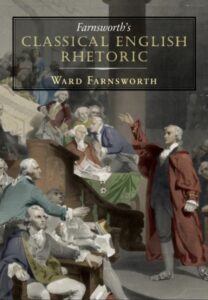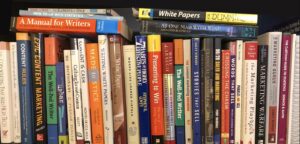Book review: Farnsworth’s Classical English Rhetoric
For years, I never knew that the process of building an argument has a name.
And that name is rhetoric.
And that every white paper I wrote was an exercise in rhetoric.
As I slowly got a clue, I revisited Aristotle‘s three elements of persuasion.
I find it very powerful to know which element to use when and in what proportion in a white paper. Ever since I’ve continued to study rhetoric as a useful hobby.
So when my colleague Steve Maurer told me about his favorite book on rhetoric, I ordered it immediately.
Farnsworth’s Classical English Rhetoric is a real treat. It was written by Ward Farnsworth, a law professor at the University of Texas.
This book has three main parts:
• Repetition of words and phrases
• Structural matters
• Dramatic devices
Each part presents hundreds of choice examples from well-spoken British, Irish, and American writers and leaders.
All told, the book includes 1,000+ examples of 20 rhetorical devices, interleaved wonderfully in a thoughtful order.
The earliest draw on Shakespeare and The King James Bible from around 1600. The latest cover writers and politicians up to about 1950.
We encounter the American founding fathers, Burke, Churchill, Dickens, Lincoln, Melville, and Shaw, plus countless others.
As Farnsworth suggests, studying many examples is the best way to gain more familiarity and confidence with rhetoric.
I find it a real pleasure to immerse myself in these passages, examine how they work, and learn the category they fit under.
Although this book works well if you read it from start to finish, you don’t need to read cover to cover.
It’s enlightening just to dip into it anywhere and savor the bon mots from the past.
Why not use more recent examples?
Because, says Farnsworth, “today’s politician tends to be a creature of very modest literacy and wit who spoils what he touches.”
Skillful use of rhetoric requires moderation. And it works best to convey significant ideas.
Yet most leaders now lack any restraint, he notes, and use overblown rhetorical devices to convey trivial or self-serving information.
If any of them had anything truly portentous to say, they’d be at a loss for words: They’ve already worn out every superlative in the dictionary.
Their abuse has given “rhetoric” a bad name, as something we should avoid and mistrust.
The abuse of rhetoric
“Do you find yourself wincing daily at some dumb and hyperbolic statement by a politician, media personality, or online influencer?” asks John Halpin in a recent piece in the Liberal Patriot newsletter.
You’re not alone, he says. Politicians constantly annoy people with their “incendiary rhetoric.”
Politics today, adds Halpin, is “built on cultural stunts and ideological hectoring rather than persuasion and reason.”
For example, consider former UK prime minister Boris Johnson, who benefitted from a posh education at Eton College.

Politician Boris Johnson
On occasion, he managed a good sound bite like this:
“My speaking style was criticised by no less an authority than Arnold Schwarzenegger. It was a low moment, my friends, to have my rhetorical skills denounced by a monosyllabic Austrian cyborg.”
But Johnson’s lies and exaggerations ultimately caught up to him, and he was forced to resign as prime minister. No amount of rhetoric could save him!
The decline and fall of rhetoric
This book’s focus on the past makes sense for another reason as well.
For 1,500 years the study of rhetoric was a cornerstone of any education.
But the subject slowly fell out of favor in the past 200 years, and was tossed out of public schools about 50 years ago.
Hence my silly impression that rhetoric was old-fashioned and boring.
That gap left the last few generations untrained in the basics of critical thinking and effective expression.
Is it any coincidence that what now passes for “debate” is little more than yelling, interrupting, and name-calling?
Believe me, the people quoted in this book would not be impressed.
Regrettably few women quoted
My only criticism of this book is that there are regrettably few quotations from women. But that isn’t Farnsworth’s fault.
It’s a reflection of the fact that there were regrettably few women published, elected to office, or running major organizations between 1600 and 1950.
It would be interesting to see a feminist version of a title like this, based entirely on quotes from women writers and leaders. Perhaps one day we shall.

Author Margaret Atwood
For starters, I think of Margaret Atwood and Margaret Thatcher. What fun it would be to comb through their books and speeches to pull out all the best zingers!
In fact, in Sam Leith‘s wonderful book Words Like Loaded Pistols: Rhetoric from Aristotle to Obama, he says that the future of rhetoric belongs to women.
“We are now living at the dawn of the great age of rhetoric by women,” he says. “We have much to look forward to.”
In the meantime, anyone who wants to add new depth and richness to their writing would surely benefit from Farnsworth’s Classical English Rhetoric, a fascinating and highly readable exploration of classic rhetoric.
Want to hear whenever there’s a fresh article on this site? Subscribe here to stay in the know on long-form content. From time to time, we’ll also send you word about some great new resource or training. And you can unsubscribe any time.




